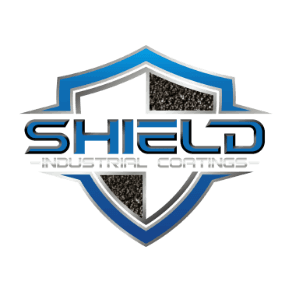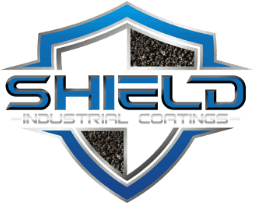Are you looking for a way to add pizzazz to your business’s garage floor? Smart thinking.
Upgrading your concrete floor might not be a priority on many business owners’ to-do lists, but it will make your commercial space feel more comfortable and transform this space’s value and utility.
Not all concrete coatings are alike, though. Let’s examine two popular concrete coating options to choose from: polyurea vs. epoxy.
Polyurea vs. Epoxy
Polyurea and epoxy may look similar at first glance, but their properties are very different. Let’s explore the core differences between these two types of coatings.
Polyurea Coating
Polyurea coating is a rubber-like synthetic polymer, also called an elastomer.
Polymers are materials that feature large molecules connected repeatedly. Examples of polymers found in nature include hair, fingernails, wool, and even your DNA.
Because polyurea’s structure is dynamic, polyurea coatings are quick-setting: They can set in 10 seconds. They are also versatile and durable.
This type of coating has several applications. However, it is typically used in automotive and industrial settings for chemical resistance, waterproofing, and corrosion prevention. It can also be used in industries like oil and gas.
This coating can be used to protect trailers and wood, too. In addition, you can use it to enhance your pool decking’s appearance.
You can use this coating in the automotive field as well.
Polyurea, which made its debut during the 1990s, was initially used to coat the steel materials used for building bridges. This was due to polyurea’s ability to resist corrosion.
Polyurea’s compounds may be created to have several hardness levels and properties. For instance, manufacturers can customize polyurea compounds to increase flexibility and strength (more on flexibility later). This is why polyurea is such a popular option for concrete coatings.
Epoxy Coating
Epoxy is also a polymer, which means it is tough and elastic. It’s a two-step thermosetting resin, meaning it begins as a liquid and ends as a resin.
The epoxy used in a concrete coating features a hardener and a resin. After these two items are mixed, they are spread over a concrete floor evenly and bond with it.
Epoxy is much like paint in that it will sit on your concrete floor’s surface. It won’t go deeper than the surface.
This type of coating is often used in industrial settings, like warehouses and areas with heavy forklift and truck traffic.
Durability Factor
Epoxy is widely advertised as being durable. That’s because it is designed to withstand impact, scratching, stains, chemicals, and tire marks.
Epoxy can also last for years if it is applied correctly. It must also be applied in climate-controlled environments for the best results.
However, let’s say you regularly pull into your commercial garage after long drives. Your tires’ heat will wear down the epoxy coating within the next few years.
Ultraviolet heat can also cause yellowing and wear in any epoxy coating in an outdoor area. In addition, this material can’t withstand extreme changes in temperature. You cannot use it outdoors for these reasons.
This is why many business owners are turning to polyurea instead.
Polyurea coatings are more durable — four times the strength of epoxy — because they are elastomers. They are chemical-resistant as well. This makes them an excellent option in settings where impact, scratches, and spills may happen.
Polyurea coatings can also withstand temperatures as high as 430 degrees Fahrenheit.
Unlike epoxy, polyurea is ultraviolet-resistant, too. This means it won’t fade and yellow outdoors. This makes it an in-demand option for sidewalks, driveways, pool decks, and patios.
Polyurea will last for a long time even in a challenging environment, so you can expect a good return on your investment when you choose polyurea.
Cost Factor
Epoxy is popular because it is wallet-friendly. It usually costs between $3 and $7 per square foot, although some coatings may cost around $12 a square foot.
Polyurea is generally more expensive because it is more durable than epoxy. This coating option costs around $7 to $12 a square foot.
Although polyurea may cost you more upfront, it will pay for itself over time due to being longer-lasting, so it’s generally worth the investment.
Cure Time Factor
A coating’s cure time is how long it takes the coating to completely harden.
It might take five days for epoxy to cure. That’s because epoxy is thick. Depending on your concrete coating’s location, this may be massively inconvenient.
However, a polyurea coating can cure within a day after it’s applied using nozzles, hoses, or spray guns.
This means you and your staff can start walking on the concrete floor two to six hours after it’s been installed. In addition, you can park vehicles on the floor within 24 hours of the coating’s installation.
Because you can complete a polyurea coating project in a single day, polyurea is the best choice if time is a factor for you.
This type of coating allows for virtually immediate use. You won’t have to wait several days to finally use your newly coated concrete floor, which is invaluable if you can’t afford an extended period of downtime.
Cure Time Considerations
Keep in mind that humidity and temperature will impact your epoxy or polyurea coating’s cure time. Polyurea coatings cure faster in hot environments. In addition, they cure more slowly in more humid environments.
Sunlight can also change how a concrete coating cures. In addition to affecting your cure time, it may change how the coating looks.
Common issues reported with epoxy in particular include the following:
- Dull appearance after curing
- Deformities and bubbling
- Cloudiness when the epoxy hardens
- Inconsistent color
- Moisture buildup beneath the coating
- Peeling floors
That’s why it’s critical to follow the manufacturer’s instructions when applying concrete coatings.
Also, note that volatile organic compounds, or VOCs, emit during the epoxy or polyurea coating application process. The VOC level is usually low, but the smell will hang around during the curing process.
This means you can expect the chemical smell to linger for one day with polyurea and five days with epoxy.
Preparation Work Factor
Both polyurea and epoxy require special concrete preparation work. Preparing your concrete surface may involve acid etching.
Acid etching involves scrubbing the concrete’s surface with water-diluted phosphoric acid or hydrochloric acid. This technique is used in both residential and commercial settings.
Keep in mind, though, that working with these types of acids can be dangerous. Hydrochloric or phosphoric acid can also damage your concrete floor if you don’t perform the etching correctly.
As part of the preparation process, you might also need to fill in any hollow spots, pits, or cracks in the concrete floor. In addition, you may add a densifier — a silicate sealer — if your concrete floor is too soft or moist.
Afterward, you might need to ground the concrete using a quality diamond grinder. This will help even and smooth the surface.
Flexibility
Epoxy and polyurea vary in their flexibility as well.
Epoxy can cure to very hard surfaces. However, it cannot withstand the contracting and expanding of concrete. This causes epoxy to become brittle and flake or chip.
Polyurea has 10 times the flexibility of epoxy, so it can easily contract and expand with your concrete floor. This makes polyurea more likely to hold up in changing weather conditions. It won’t peel or crack.
Customizability Factor
Finally, both polyurea and epoxy come in various color options, making them perfect for customizing your space. The maker of your chosen concrete coating can tell you what color flakes they offer and help you choose one that will best fit your space’s existing decor.
Color flakes can especially add to your business’s professionalism. When guests arrive at your establishment, they will instantly notice your flooring. The right color can leave a positive, lasting impression on any customer who visits your site.
The scattering of color flakes in polyurea coatings will make your floor look uniform as well, even if you mix different color patterns.
The Takeaway: Polyurea vs. Epoxy
If you’re looking for a concrete coating that will be durable, and requiring minimal upkeep, go with polyurea.
Note, though, that when installed properly, epoxy coatings look almost like polyurea coatings. That’s because both provide the same types of finish options ranging from metallic to solid color, quartz, glitter, and chip finishes.
An epoxy coating system consists of a base coat, a primer, and two polyurethane top coats. The base coat can come in various colors.
In addition, you can customize the finish, opting for high gloss or matte. You may also include colorful flakes, which will add more style and slip resistance.
A polyurea coating system features a base coat and polyurethane top coat. It usually also includes vinyl flakes for slip resistance.
This type of coating typically has a glossy, clear finish as well. This makes it look like wet concrete.
Both types of coatings can elevate your space’s look and feel for years to come. Both polyurea and epoxy are also resistant to ultraviolet rays, heat, abrasion, and chemicals.
The main advantage of epoxy over polyurea is its cost-effectiveness. However, this is a short-term benefit, as epoxy won’t last as long as polyurea.
The lifespan of an epoxy coating is five to 10 years compared with polyurea coatings’ lifespan of more than 15 years. This means if you choose epoxy, you may end up replacing it three times in 15 years versus one time with polyurea.
Additional Polyurea Coating Benefits
You can easily apply polyurea coatings in extremely cold or hot temperatures. This means applying this coating can be a breeze whether your commercial space is in Alaska or Arizona.
In addition, polyurea coatings can chemically resist oil, gas, and salt, not just harsh chemicals. Because they resist scratches more easily than epoxy, pet paws are no match for them, too.
A polyurea coating is also waterproof. This makes it an excellent choice for resurfacing a slippery walkway or pool deck, as we mentioned earlier.
Important Considerations
If your budget is tight and you’re looking for a concrete coating that will quickly and inexpensively spruce up your garage, then epoxy may be enough for you. However, polyurea is always the better option if you plan to be in business for many more years. Your goals and needs will ultimately dictate your choice of product.
Also, how you install your concrete coating matters. Whether you choose polyurea or epoxy, a subpar coating installation will not last.
If you don’t feel comfortable doing a DIY concrete coating project, you may want to hire a professional concrete coating installer to handle this task for you.
This is especially important with polyurea coatings, as these coatings are quick-curing as we mentioned earlier. If these highly reactive coatings set too quickly, they will not adhere to the concrete floors they’re being applied to.
Formulators are necessary to ensure complete adhesion before the coatings set, which can be tricky for non-professionals.
Both a quality product and quality craftmanship are necessary to keep your concrete floor looking great and standing the test of time.
How We Can Help with Our Concrete Coatings
If you’re trying to compare polyurea vs. epoxy, polyurea is the best choice for your concrete floor.
Polyurea is more durable and flexible than epoxy. It also has a faster cure time. Although it is generally more expensive, it lasts longer, which makes it worth the investment.
At Shield Industrial Coatings, we take pride in offering high-quality polyurea coatings. Our coatings cure so quickly that you can apply weight to them in just 30 seconds.
Get in touch with us to learn more about our coatings, and order today!

